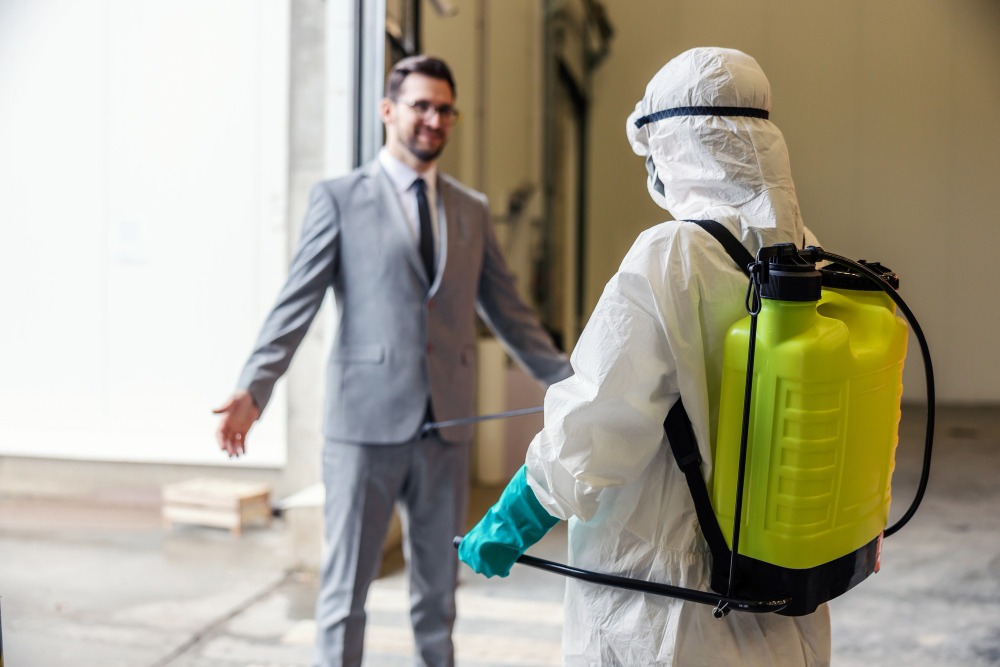Building a successful exterminator business requires more than just the right equipment and licenses. It begins with assembling a skilled and dedicated team. Whether you are exploring how to start a pest control business or how to start a mosquito control business, the quality of your employees is crucial for SEO for pest control companies. They can make or break your company’s reputation. From technicians to office staff, each member plays a vital role in delivering excellent service, ensuring customer satisfaction, and maintaining safety standards.
As you learn how to start an exterminator business, one of the first challenges is understanding the necessary roles and hiring the right people. Additionally, developing effective training programs is essential. These programs ensure your team stays updated on industry regulations, pest control techniques, and safety protocols. This guide will help you navigate the hiring and training process. With the right approach, you can confidently build a team that contributes to the long-term success of your pest control business.
I. Understanding the Staffing Needs of Your Pest Control Business
When figuring out how to start a pest control business, understanding your staffing requirements is crucial for effective operations. The number of employees and their specialized roles will significantly impact the efficiency and growth of your exterminator business. From field technicians to office staff, having the right team in place is essential. This ensures that your pest control company operates smoothly and effectively, contributing to your overall success in the competitive landscape, especially when implementing SEO for pest control companies.
1. How Many Employees Do You Need to Start a Pest Control Company?
The number of employees you need to start a pest control company will vary based on your business size and the services you intend to offer. A small exterminator business might start with just two or three people. You’ll need a licensed pest control technician, an office manager to handle scheduling and customer inquiries, and a sales representative to attract new clients. If you are considering how to start a mosquito control business or a more specialized service, you may need fewer employees initially. However, it’s important to plan for future growth.
As your pest control business expands, you will likely need to hire additional technicians to manage the increasing workload. If your goal is to cover a wide geographic area or offer specialized services, such as wildlife control or termite inspections, you must plan your staffing accordingly.
2. Specialized Roles for an Exterminator Business
Starting a pest control business involves more than just hiring technicians. Several key roles need to be filled to ensure your exterminator business runs efficiently. The first and most important role is the licensed pest control technician. These individuals are responsible for visiting clients’ homes or businesses, diagnosing pest problems, and applying treatments.
In addition to technicians, you will need office staff to manage the day-to-day operations of your pest control company. An office manager or administrative assistant can handle client appointments, customer service, billing, and inventory. As your business grows, hiring a marketing professional or sales manager will help attract new clients and boost your revenue. In the highly competitive exterminator market, it’s also wise to have a dedicated customer service representative. This person will ensure client satisfaction and address any concerns.
3. What Do I Need to Start a Pest Control Business in Terms of Staff?
When figuring out what you need to start a pest control business, having a solid staffing plan is critical. You will need to hire licensed and trained pest control technicians, especially if you offer specialized services like mosquito control or termite management. Many states require pest control technicians to be certified, so ensuring your staff has the necessary qualifications is essential. Additionally, invest in ongoing training to keep your team updated on the latest pest control techniques and safety procedures.
Beyond technicians, it’s important to build a support team to handle scheduling, client relations, and administrative tasks. Depending on the size of your exterminator business, you may also need a sales team and marketing personnel to help grow your customer base. Ultimately, starting a pest control company requires more than just the right equipment. It demands building a skilled, dedicated team that can support the business’s long-term success.
II. Recruiting the Best Talent for Your Exterminator Business

Building a successful exterminator business starts with recruiting the right people. The employees you hire will be the face of your pest control business. Their skills will directly impact the quality of your services. Whether you’re wondering how to start a pest control business or how to start a mosquito control business, having a team of skilled technicians is essential. This ensures efficient, safe, and effective pest management solutions.
1. How to Start a Pest Control Business with Skilled Technicians
When starting a pest control company, one of the most critical roles you’ll need to fill is that of the technician. Skilled technicians are the backbone of any exterminator business. They handle the day-to-day tasks of inspecting, diagnosing, and treating pest infestations. But how do you ensure that you’re hiring the right talent for the job?
Firstly, look for candidates with practical experience in pest management. Whether they’ve worked in residential, commercial, or agricultural settings, technicians with hands-on experience will be better equipped to handle various pest challenges. Formal certification from a recognized pest control training program is another key factor. Many states require licensing for pest control technicians, so checking local regulations is essential to ensure compliance during recruitment. In addition to technical skills, excellent communication and customer service abilities are crucial. Technicians should clearly explain treatment options and maintain professionalism with clients.
2. Key Qualifications to Look for When You Start a Pest Control Company
As you start a pest control business, identifying the right qualifications is critical for building a strong team. Beyond certifications and experience, the ideal pest control technician should have a solid understanding of pest biology and behavior. This knowledge enables them to make informed decisions on tackling different pest infestations. Such expertise is crucial for providing effective services.
Another key qualification is problem-solving ability. Technicians must often think on their feet and develop customized treatment plans that address unique customer issues. Physical stamina is also important, as the job frequently involves long hours, outdoor work, and handling equipment in tight or uncomfortable spaces. Lastly, a strong commitment to safety practices is vital. Pest control work can involve hazardous chemicals, so technicians must be vigilant about following safety protocols and minimizing risks.
3. How to Start a Mosquito Control Business and Recruit Specialized Talent
If you’re focusing on how to start a mosquito control business, you’ll need technicians with specialized skills tailored to mosquito management. Recruiting talent for a mosquito control business differs slightly from traditional pest control. Mosquito control often requires a deep understanding of insecticides, larvicides, and the lifecycle of mosquitoes. Therefore, seeking candidates with specific expertise in these areas is key.
In addition to technical knowledge, look for individuals with experience using specialized mosquito control equipment, such as foggers and sprayers. Candidates who understand the environmental factors contributing to mosquito breeding and can identify water sources that attract mosquitoes are invaluable to your team. Furthermore, mosquito control technicians should be comfortable with public education efforts. Community outreach is often a significant part of successful mosquito management programs.
III. The Importance of Training in a Successful Pest Control Business

Training is a critical aspect of building a successful pest control business. It ensures that your team has the skills and knowledge needed to handle the complexities of extermination safely and effectively. Whether you’re figuring out how to start a pest control business or looking to improve an existing exterminator business, training programs lay the foundation for high performance. They also promote customer satisfaction and ensure regulatory compliance.
1. Training Programs to Implement When Starting a Pest Control Business
When starting a pest control business, designing comprehensive training programs is essential. These programs should cover a wide range of skills. Technical training should include pest identification, safe handling of chemicals, and proper use of extermination equipment. Specialized training should also focus on controlling specific pests, such as mosquitoes. If you’re exploring how to start a mosquito control business, your staff will need in-depth knowledge of mosquito habitats, breeding patterns, and prevention techniques.
Apart from technical expertise, soft skills training is equally important. Employees should receive training in customer communication, sales techniques, and delivering excellent customer service. Providing both technical and soft skills training ensures that your team can operate efficiently in the field. It also helps them build strong relationships with clients.
2. How to Start a Pest Control Company with Effective Employee Training
Starting a pest control company requires more than hiring the right talent; it involves equipping them with the right training from day one. Begin by creating a structured onboarding process that immerses new hires in your company’s mission, values, and industry best practices. Offer hands-on training where employees can observe experienced technicians in action before they perform tasks on their own.
Additionally, compliance with local, state, and federal regulations must be an integral part of the training. Employees should know how to handle pesticides safely and follow legal guidelines to avoid any issues with health and environmental safety. Effective employee training prepares your team to be knowledgeable, safe, and responsive to client needs, which can be the key to long-term success.
3. How Ongoing Training Impacts Your Exterminator Business’s Success
In the pest control business, continuous learning is vital. Ongoing training keeps your team updated on new pest control methods, technological advancements, and changes in regulatory standards. For an exterminator business to remain competitive, it is essential that employees continuously improve their knowledge and skills. Regular training refreshers and certifications help ensure that employees stay proficient, which reduces errors and enhances service quality.
Furthermore, ongoing training boosts employee morale and loyalty. When you invest in the development of your staff, they feel more valued and are more likely to stay with your company longer. This reduces turnover and creates a more experienced, reliable team that can contribute to the growth of your pest control business. Whether you’re exploring how to start a mosquito control business or expanding your existing pest control company, investing in continual training is a crucial strategy for sustained success.
IV. Retaining and Motivating Your Pest Control Team

Retaining and motivating a skilled team is essential to the long-term success of any pest control business. Employees who feel valued and supported are more likely to stay with your exterminator business, reducing turnover and ensuring consistent service quality. Building a positive work culture, offering competitive benefits, and providing clear growth opportunities are all key to maintaining an engaged and motivated team.
1. Building a Positive Work Culture in Your Pest Control Business
A positive work culture is the foundation for employee satisfaction in any pest control company. To create this environment, it’s essential to foster open communication, recognize and reward good performance, and prioritize team collaboration. This not only enhances morale but also promotes a sense of loyalty to the business. When starting a pest control business, it’s important to establish these values early on, ensuring that your team feels appreciated and motivated from the outset. A collaborative and respectful workplace can make your exterminator business stand out, attracting talent that thrives in such an environment.
2. Offering Competitive Benefits and Growth Opportunities in an Exterminator Business
Offering competitive benefits and clear growth opportunities is crucial for retaining top talent. Employees in a pest control business want to know that their hard work will be rewarded, both financially and in terms of career progression. Providing benefits such as health insurance, paid time off, and performance bonuses can make your exterminator business more attractive. Moreover, creating opportunities for professional growth, such as ongoing training, certification programs, and promotion paths, helps employees see a long-term future with your company. When you start a pest control company, setting up these benefits and growth structures can be a decisive factor in attracting and keeping high-quality staff.
3. How to Start a Pest Control Business That Attracts and Retains Top Talent
Attracting and retaining top talent in your exterminator business starts with understanding what employees value. When considering how to start a pest control business, think about how your company’s culture, benefits, and development opportunities align with the expectations of skilled professionals. Competitive salaries, a positive work environment, and clear paths for advancement will set your pest control company apart. Additionally, focusing on training and certification, especially for those interested in specific areas like mosquito control, can help bring in specialists who are eager to grow with your business. Retaining top talent not only enhances the reputation of your exterminator business but also drives long-term success in the industry.
Conclusion
In conclusion, building a successful exterminator business hinges on hiring and training the right team. As you embark on your journey of how to start a pest control business, understanding your staffing needs is crucial. A well-defined recruitment strategy will help you find skilled professionals who can meet the demands of the industry. Whether you are figuring out how to start a pest control company or diving into a niche like mosquito control, identifying the right roles and qualifications is essential for success.
Training your employees not only enhances their skills but also fosters a culture of safety and excellence within your pest control business. Implementing comprehensive training programs will ensure that your team is equipped to handle the challenges they may face in the field. Moreover, retaining your employees through motivation and support will contribute to a strong and dedicated workforce, which is vital for the growth of your exterminator business.
Ultimately, knowing what do I need to start a pest control business extends beyond equipment and licenses; it encompasses the human element that drives your company forward. By focusing on effective hiring and training strategies, you will lay a solid foundation for a thriving exterminator business that stands out in a competitive market.
Author



